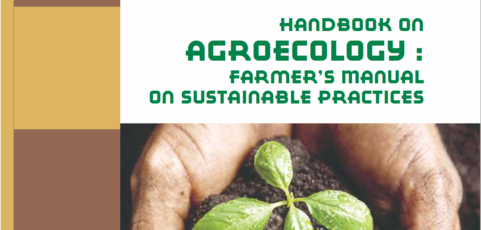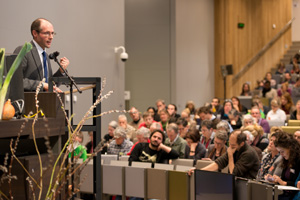A group of coffee farmers in Turrialba, Costa Rica,is successfully exploring diversification options with horticultural food crops. This is being done in collaboration with two vegetable seed banks that allow family farmers to use varieties freely under the multilateral system of FAO´s International Treaty on Plant Genetic Resources for Food and Agriculture.
Access and benefit sharing of genetic resources for family farmers: Theory and practice
Only a small number of governments have established meaningful and effective farmer-centred measures for the implementation of access and benefit sharing of genetic resources. One reason is the highly complex nature of the international regulatory system. This special issue of Farming Matters magazine presents practical ways in which access and benefit sharing for family farmers can be enhanced through collaborative efforts based on the rural realities, knowledge and needs of local communities. Key in this approach are community seed banks and farmer seed systems, which serve as local points of access to genetic resources as well as ensuring equitable sharing of benefits. This article presents an overview of both the ‘formal’ and ‘informal’ access and benefit sharing systems that are currently being used, and examines the theory and practice of these systems.
Institutionalising dialogue in Rwanda through innovation platforms
A platform of farmers, retailers and service providers,civil society organisations, NGOs, government officials, and researchers improves livelihoods in Rwanda. Through
interaction and collaboration, these groups experiment with various technological and institutional innovations, thereby tackling local agricultural challenges. This
experience illustrates the importance of institutionalising a space where knowledge can be co-created.
Perspectives: Strengthening people’s knowledge
For the past half century agricultural innovation has denied a voice to the many groups who work outside the profession of science – farmers, food providers, women and the urban poor. The value of their expertise gained through practical experience must be recognised in the production and validation of knowledge.
Strawberry fields forever
Professor Steve Gliessman and farmer Jim Cochran are among the movers and shakers of the strawberry sector in California. Since the 1980s they have been experimenting with sustainable ways to grow strawberries and with alternative food networks. Committed to the agroecological transition, they built a powerful farmer- researcher partnership that was groundbreaking for farmers, academia and the strawberry industry as a whole.
Climate Change and the Agriculture Crisis: Agroecology as a Solution (Hindi version)
This publication in Hindi tries to address important questions such as:
What exactly is the climate change crisis? How does it affect us? Are we causing it? How? How is it going to affecting our land, water, food and lifestyle? Can we anything about it ? How ? Why is the practice of agroecology so important in addition to clean energy?
How global food traders manage our water
To many analysts, global water governance is about getting the institutions right: more accountable water users and more public participation in decisions. But are we barking up the right tree? In this analysis, we argue that when analysing global water governance, one needs to look at the global players that really matter – an exclusive group of global food traders. These traders must be held accountable for their water footprint.
Building, defending and strengthening agroecology
This publication is based on a research conducted on the meaning and politics of agroecology from social movement perspectives.
Read more
Handbook On Agroecology: Farmer’s Manual on Sustainable Practices
This booklet is aimed to educate and inform farmers about diverse possibility of sustainable and safe food production methods and its techniques. This handbook is designed as a practical guide to these different practices of agroecology and their specific principles, techniques and strategies.We hope that these practical techniques would help to address the needs of especially small and marginal farmers who are contemplating to switch over to low-cost agriculture. We also hope that sustainable agricultural practices mentioned here can easily be adapted by small farmers without involving much input costs.However the set of practices mentioned here are not the only valid roadmap available for adopting low-cost organic agriculture. A skillful agroecology practitioner can come up with their own innovative techniques by applying different agroecological principles to suite particular crops, soil conditions and available natural resources.
Agroecology and the right to food – Interview with Olivier De Schutter
Interview > Olivier De Schutter – “Agroecology is really common sense. It means understanding how nature works, to replicate the natural workings of nature on farms in order to reduce dependency on external inputs. Agroecology preserves the ability for future generations to feed themselves. I believe we should teach more about agroecology and encourage exchanges between farmers. We cannot continue in this impasse of an oil dependent food production system.”




